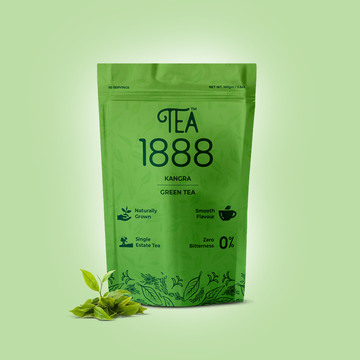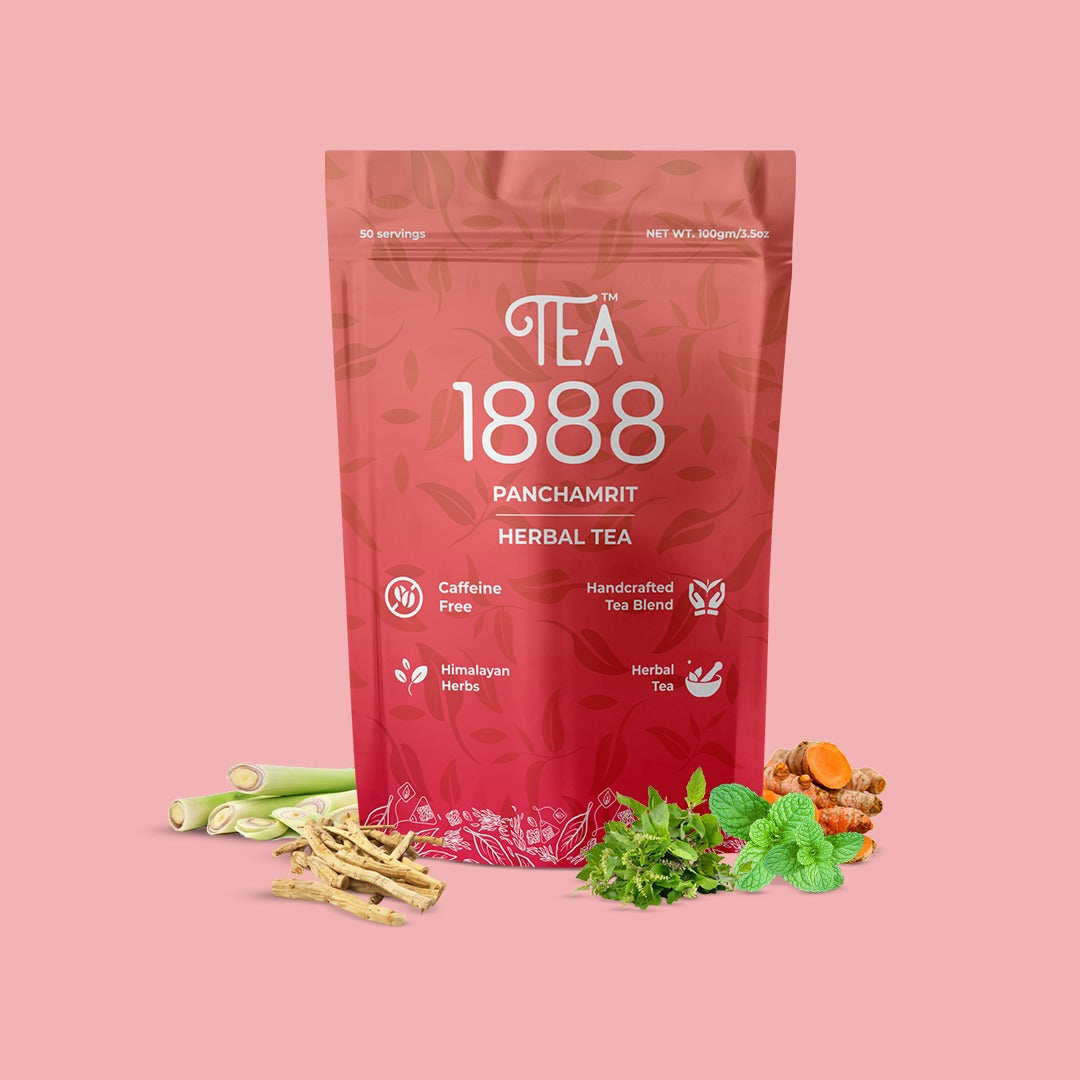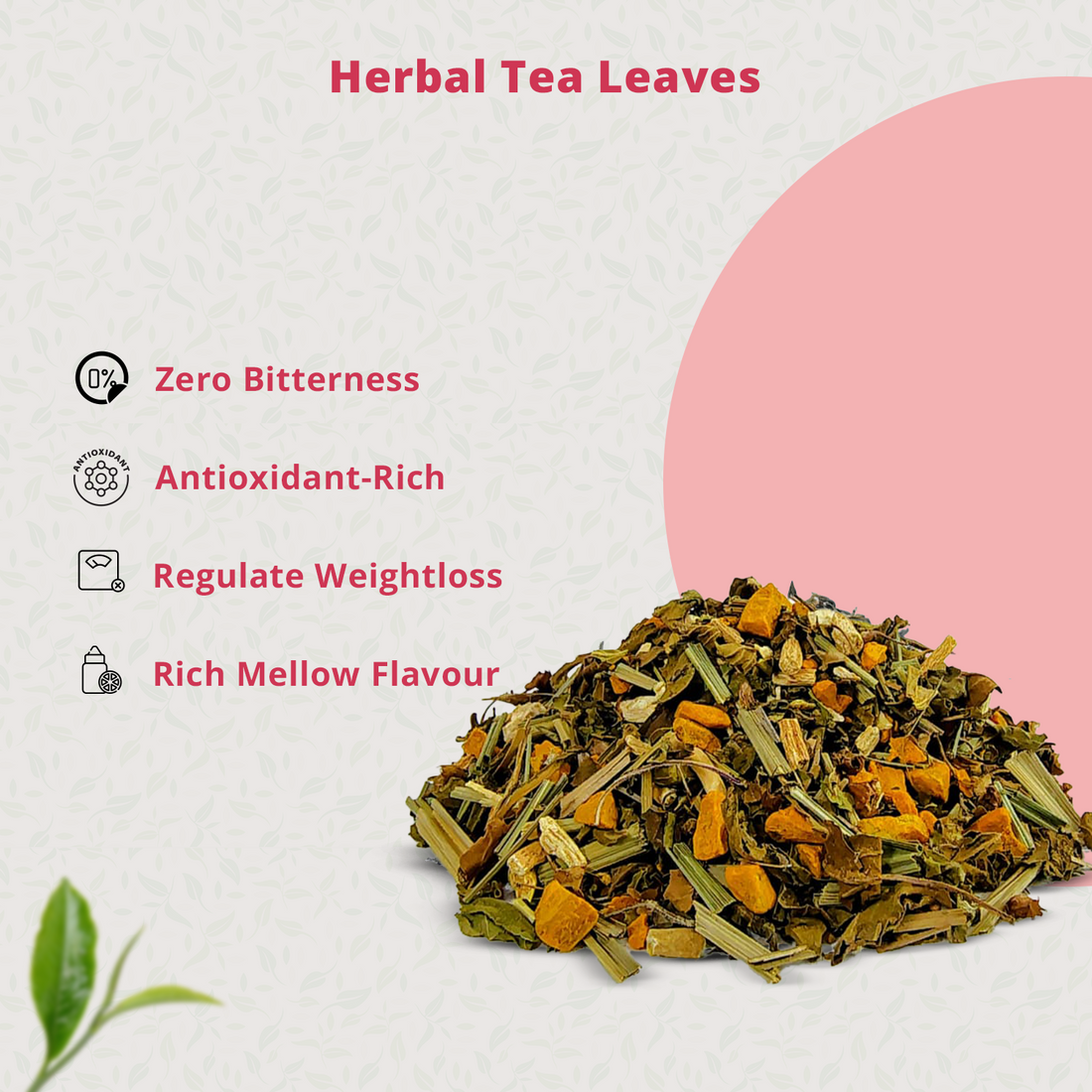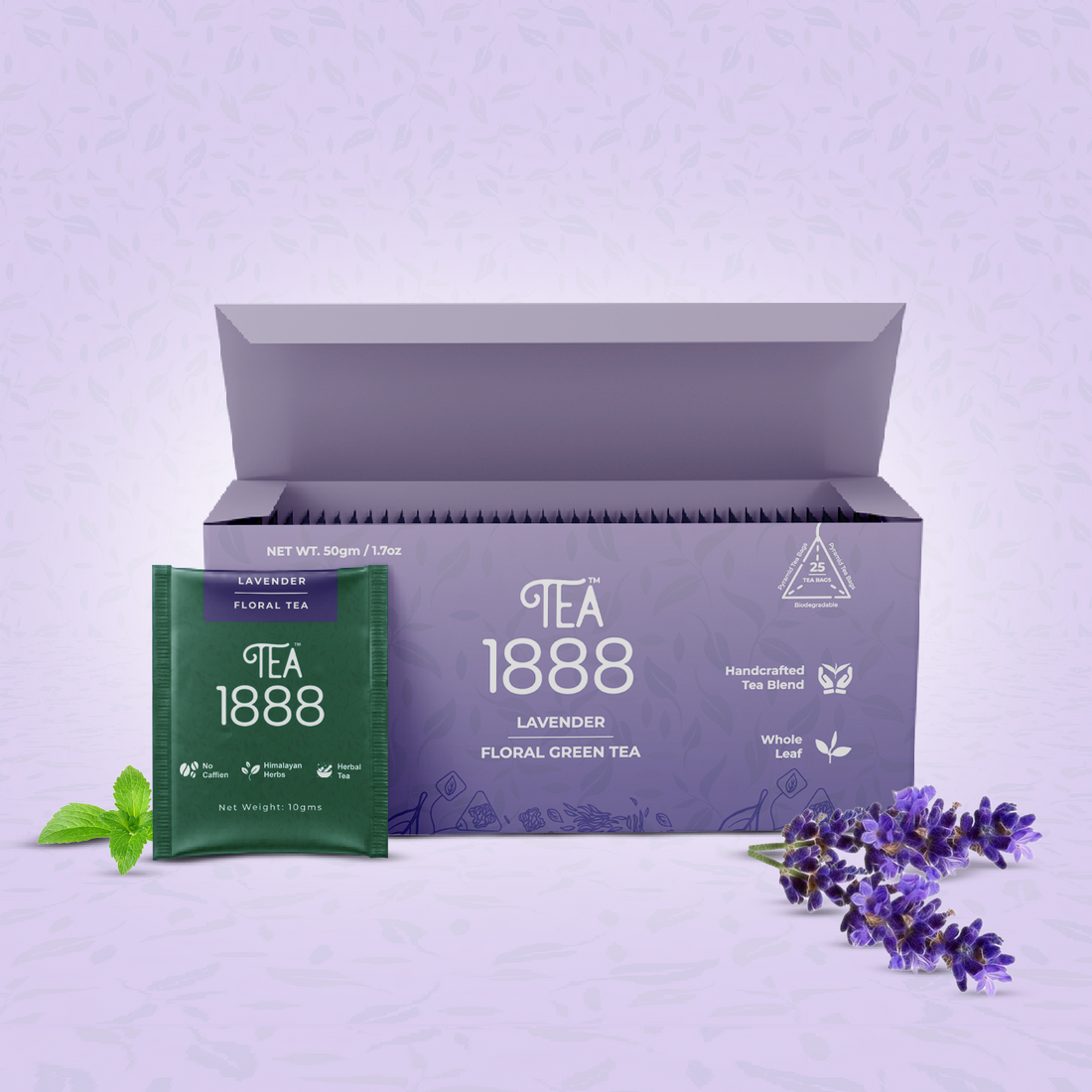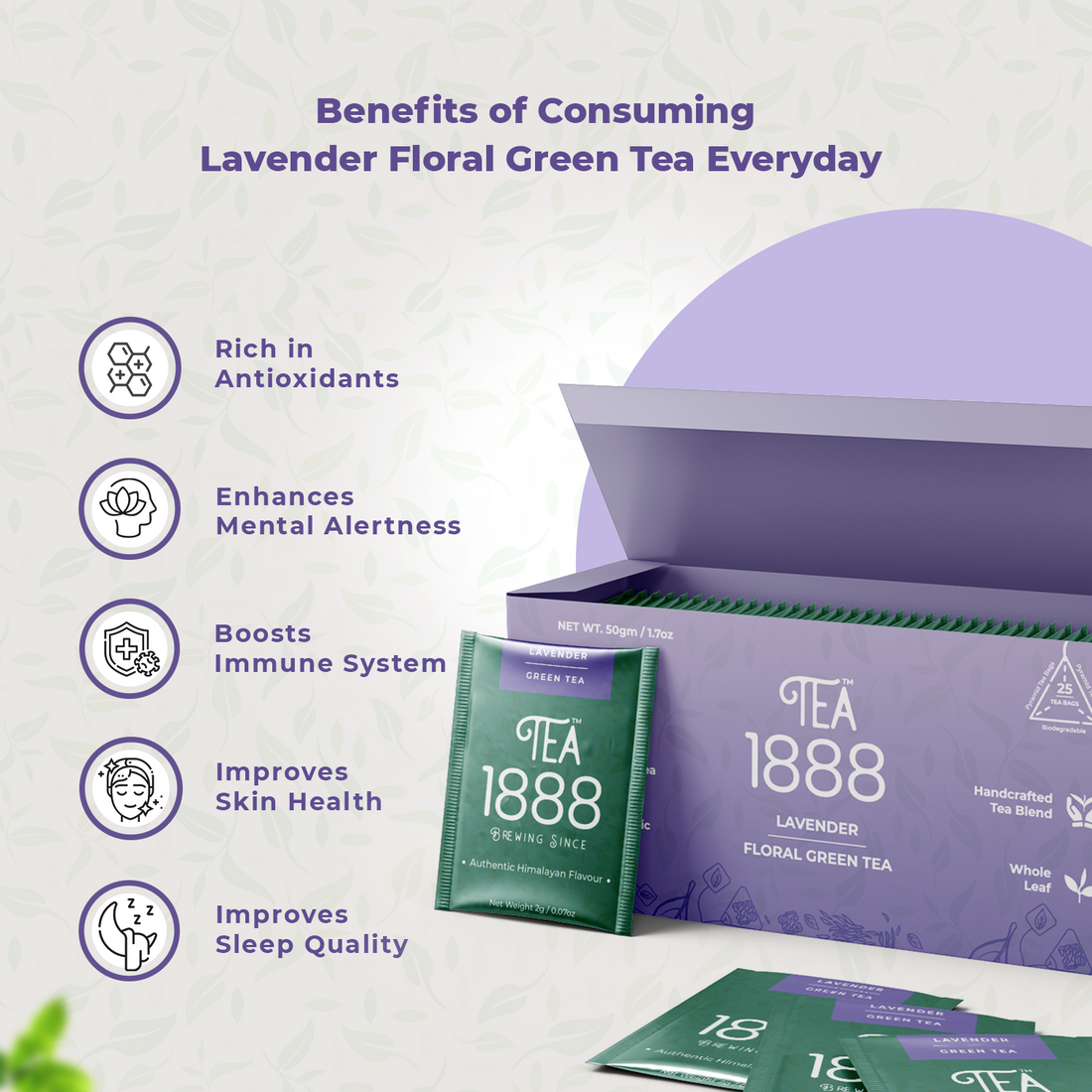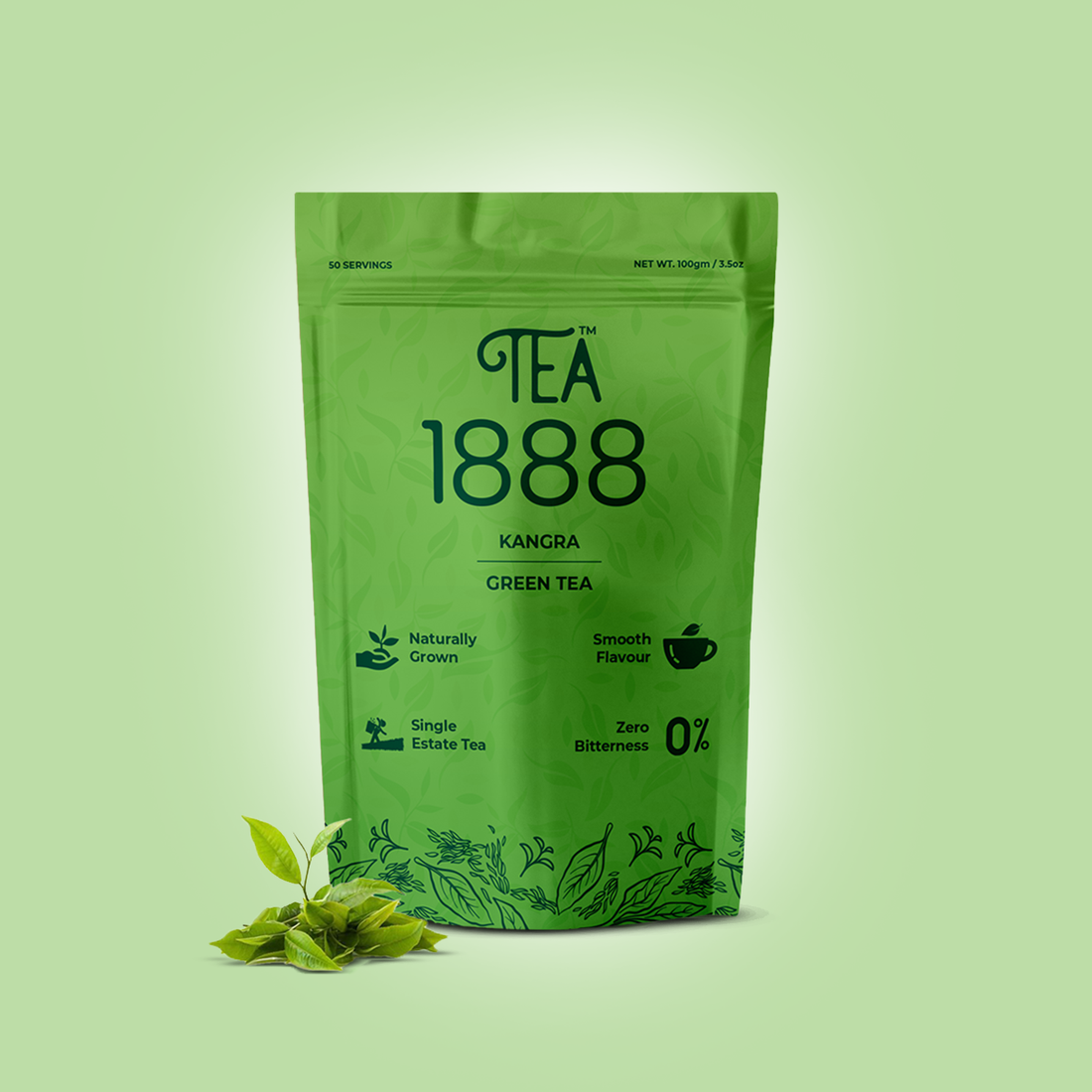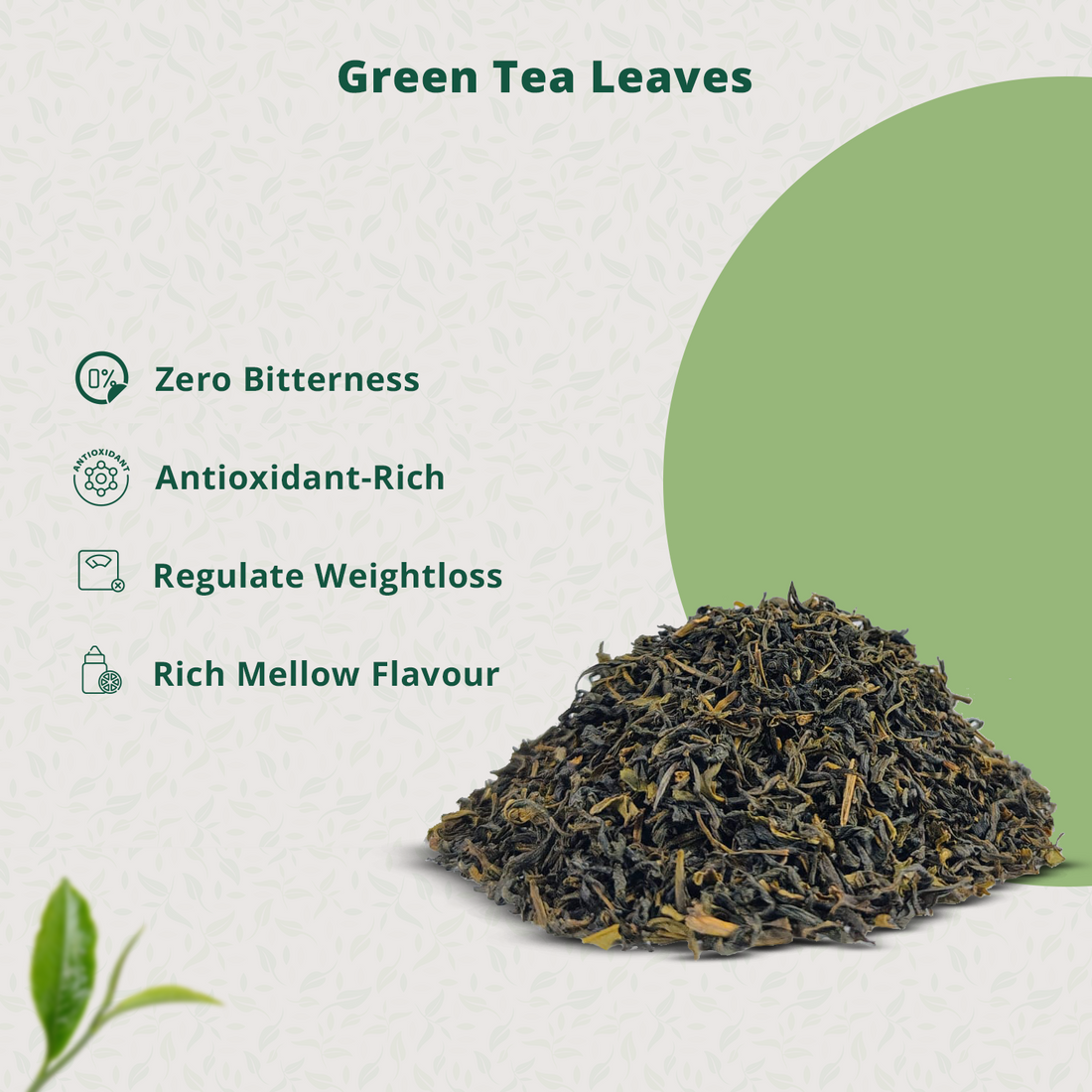Tea ranks as the second most popular beverage worldwide after water. Learning about herbal tea benefits could be one of the best choices you make for your morning routine. Your body needs proper rehydration when you wake up. Herbal tea provides a soothing, flavorful alternative to plain water. On top of that, these morning brews pack powerful antioxidants like flavonoids and polyphenols.
These compounds fight oxidative stress, reduce inflammation, and boost your immunity. Some varieties can improve your metabolism, support heart health, and help prevent certain cancers. You'll find complete wellness benefits in every morning cup, whether you choose the gentle notes of Turmeric Mint - Herbal Tea, the balanced blend of Panchamrit Herbal Tea, the refreshing Turmeric Mint - Tulsi Tea, or the restorative Turmeric Ashwagandha Herbal Tea.
Improves Gut Health
A warm cup of herbal tea can do wonders for your morning routine. It does more than wake you up - it can improve your digestive system and gut health by a lot. Research shows that herbal tea's connection to gut wellness runs deeper than most people think.
Gut microbiome benefits of herbal tea
Your gut contains trillions of bacteria that play vital roles in digestion, immunity, and overall health. Herbal teas can boost this internal ecosystem. People who drink green tea (up to 1000 mL daily, about 4-5 cups) show higher levels of good Bifidobacterium bacteria. More studies show that black, oolong, Pu-erh, and Fuzhuan teas can change microbial diversity and improve the ratio of Firmicutes to Bacteroidetes. This becomes especially important when you have reduced Bacteroidetes, which scientists often see in obese individuals.
Tea polyphenols create what scientists call a "bi-directional" relationship with gut flora. They shape microbiota makeup while gut bacteria break them down into active compounds. Your body absorbs about 80% of these good compounds and releases them through urine. If you drink polyphenol-rich herbal teas regularly, they can help good bacteria like Lactobacillus, Bifidobacterium, Roseburia, and Akkermansia grow while reducing harmful bacterial groups.
Herbal teas that support digestion and gut flora
Each herbal tea brings its own digestive benefits through unique compounds:
- Ginger Tea: Gets your stomach moving and emptying, which helps with nausea, cramping, bloating, and gas. Taking 1.5 grammes of ginger daily helps reduce nausea and vomiting from pregnancy, chemotherapy, and motion sickness. Ginger tea might work just as well as ginger supplements.
- Peppermint Tea: Contains menthol that helps digestive issues by relaxing digestive muscles. A 4-week study showed that 75% of IBS patients who took peppermint oil capsules twice daily felt better. Peppermint tea could offer similar benefits.
- Fennel Tea: Protects against stomach ulcers with its antioxidant compounds. It also helps you stay regular and eases chronic constipation. Elderly adults who drank fennel-containing tea daily for 28 days had many more bowel movements than those who took a placebo.
- Chamomile Tea: Soothes your digestive tract with anti-inflammatory properties. A 2025 study showed that 500 mg of chamomile extract before middle ear surgery reduced vomiting and nausea compared to the control group.
Specialty blends like Turmeric Mint - Herbal Tea mix anti-inflammatory benefits with better digestion. Turmeric Ashwagandha Herbal Tea helps your body handle stress that can upset your stomach.
Morning tea for IBS and bloating relief
Herbal tea in the morning can help if you deal with IBS or frequent bloating. Peppermint tea relaxes your intestinal muscles and eases stomach pain, which helps IBS patients a lot. Keep in mind that peppermint tea might make acid reflux worse.
Panchamrit Herbal Tea and Turmeric Mint - Tulsi Tea have ingredients that help release gas and reduce bloating. Let your body start digesting food for 15-30 minutes before drinking these teas. Chamomile tea works great for IBS symptoms. Research from 2015 found that chamomile helped reduce IBS symptoms, and these benefits lasted weeks after people stopped drinking it. Chamomile's anti-inflammatory elements help reduce intestinal muscle spasms.
Let your tea steep for 3-5 minutes to get the most digestive benefits. This releases active compounds that boost digestive enzymes and support healthy gut bacteria. The simple act of enjoying warm tea can become a peaceful morning ritual that helps your digestion work better.

Boosts Brain Function and Focus
Your morning herbal tea does more than hydrate and help gut health - it gives your brain a boost too. Research backs up what tea lovers already know: herbal teas can substantially boost brain function and mental focus throughout the day.
Cognitive benefits of herbal tea in the morning
The brain easily falls prey to oxidative stress. Many herbal teas contain unique compounds that help prevent this damage. Studies show people who keep taking tea score better on verbal fluency tests, especially older adults. Your morning tea helps brain health in several ways:
- Antioxidant protection: Tea's catechins shield brain cells from oxidative damage and support better long-term cognitive function.
- Improved blood flow: Some herbal varieties boost circulation to your brain and deliver essential nutrients and oxygen.
- Reduced inflammation: Teas like turmeric shield neurons from harm with their anti-inflammatory properties.
- Stress reduction: Many herbal blends help you relax while staying alert - perfect for clear thinking.
The research shows interesting results. People who drink three or more cups of green tea daily have 3% fewer white matter lesions in their brains compared to those who drink just one cup. Those who drink seven to eight cups show 6% fewer lesions.
L-Theanine and natural focus enhancers
L-theanine stands out as tea's most impressive brain-boosting compound. This unique amino acid lives mainly in tea leaves. Unlike typical stimulants, it helps you stay alert yet relaxed by affecting alpha brain waves linked to calm awareness. L-theanine works great with caffeine. A small study revealed that mixing L-theanine (97mg) with caffeine (40mg) helped young adults focus better on challenging tasks. This combo smooths energy levels and improves:
- Sustained attention
- Memory performance
- Task switching ability
- Mental alertness without anxiety
The best ratio seems to be 2:1 (200mg L-theanine to 100mg caffeine) to get optimal cognitive benefits. This balance lets you focus better without caffeine's usual downsides like jitters or afternoon crashes.
Best teas for mental clarity
Some teas are stars when it comes to boosting brain power:
- Green tea leads the pack for cognitive benefits. A study in Molecules showed that people who took decaffeinated green tea catechins daily for 12 weeks had better working memory and attention. Blends like Turmeric Mint - Tulsi Green Tea add extra brain-supporting herbs.
- Matcha packs more L-theanine than other teas, giving you steady energy without the jitters. Its concentrated form delivers more antioxidants than regular green tea, making it excellent for brain health.
- Rosemary tea might not be as popular, but it curbs inflammation and supports overall brain health. Its carnosic acid protects neurons and helps boost memory while reducing mental fatigue.
- Peppermint tea makes you more alert and improves memory without caffeine. A randomised trial proved that it boosted cognitive performance and brain blood flow in healthy adults.
Specialty blends like Panchamrit Herbal Tea and Turmeric Ashwagandha Herbal Tea combine multiple herbs that support brain function. Ashwagandha works as an adaptogen that boosts cognitive function while helping with stress-related mental fatigue. The best time to drink your chosen tea is 15-30 minutes before you start tasks that require focus. This gives the beneficial compounds time to reach your brain through your bloodstream.
Strengthens the Immune System
Your body's natural defence against illness comes from a resilient immune system. Regular herbal tea can substantially strengthen these protective mechanisms. Both ancient wisdom and modern research show certain herbs are powerful allies for immune health.
Immune-boosting properties of herbal tea
Herbal teas are full of antioxidants that help curb oxidative stress, a key factor in immune system function. These natural compounds support your body's defence mechanisms in many ways. Many herbal teas have natural antiviral, antimicrobial, and immune-enhancing properties that help fight off illness. The benefits come from bioactive compounds found in various herbs. These teas contain polyphenols that show substantial antioxidant activities to treat inflammation and affect metabolic biomarkers.
These compounds don't just give a temporary boost; they help build your overall immune function for long-term health. Traditional medicine systems have long known about herbal teas' power to support immune health. Modern science now validates this ancient wisdom. Research confirms that herbs provide natural immune support through their unique phytochemical profiles.
Herbs like tulsi and ginger for immunity
Tulsi (Holy Basil) stands out as an exceptional immune-strengthening herb. This powerful herb helps your body resist infections and speeds up recovery. Its antibacterial, antiviral, and anti-inflammatory properties make it valuable for immune system support. Tulsi's immune benefits come from high levels of eugenol in the essential oil, plus polyphenols including apigenin, quercetin, and ferulic acid. These compounds give tulsi excellent anti-inflammatory and immunostimulating effects.
Ginger provides remarkable immune support through different pathways. A systematic review of ginger's health effects proves it can improve immune function and reduce inflammation. Dozens of its antioxidant compounds can treat various inflammations and change metabolic biomarkers. The best benefits come from blends like Turmeric Mint - Tulsi Tea that mix multiple immune-supporting herbs. The sort of thing I love about these combinations is how they work better together. Traditional wisdom tells us that "some herbs are even more powerful when paired". Tulsi and ginger create a collaborative effort that improves overall immune function.
Morning tea routine for immune support
A morning herbal tea ritual gives your body steady immune support. Starting your day with immune-boosting herbs prepares your system to handle environmental pathogens and stress. To create a complete immune support routine:
- Early Morning: Start with Panchamrit Herbal Tea, an uplifting blend that soothes and strengthens the immune system.
- Mid-Morning: Try Turmeric Ashwagandha Herbal Tea, which combines anti-inflammatory turmeric with adaptogenic ashwagandha.
- Throughout the Day: Switch to Turmeric Mint - Herbal Tea to maintain immune support
Regular consumption works better than occasional use. Research suggests that having multiple cups throughout the day provides lasting benefits. One study showed people who consumed ginger extract (750 mg) daily for six weeks had less systemic inflammation. Drink your tea slowly between meals to absorb more immune-boosting compounds. Warm liquid helps stimulate lymphatic flow, a vital part of immune function that often gets overlooked.
Note that herbal teas work best with other immune-supporting habits like good sleep, exercise, and healthy eating. Adding specific immune-boosting blends to your morning routine is a pleasant way to strengthen your body's natural defences.
Reduces Inflammation
Many health conditions stem from chronic inflammation, and morning herbal teas provide a tasty way to curb this health issue. Traditional medicine practitioners and modern scientific research have shown how certain herbs can reduce inflammatory responses in the body.
Anti-inflammatory benefits of herbal tea
Your body naturally responds to infections, trauma, and harmful stimuli through inflammation. This response can lead to various health problems when it becomes chronic. The bioactive compounds in herbal teas have potent antioxidant and anti-inflammatory properties that neutralise free radicals, which cause inflammation.
Herbal teas reduce inflammation through specific mechanisms:
- Polyphenols: These compounds lower inflammatory markers in your body and support long-term health.
- Curcumin: Found in turmeric, this compound blocks inflammatory enzymes and has been shown to reduce pain from knee osteoarthritis.
- Gingerols: Present in ginger, these compounds decrease inflammatory proteins such as tumour necrosis factor α and interleukin-6.
Green tea's high levels of epigallocatechin gallate (EGCG) make it exceptional at fighting inflammation. People who drink green tea regularly may face lower risks of chronic inflammatory conditions like arthritis and cardiovascular disease.
Turmeric Mint - Herbal Tea and other blends
Tea blends can work better through cooperative combinations of herbs. Turmeric Mint - Herbal Tea mixes turmeric's powerful anti-inflammatory properties with refreshing mint. This soothing blend tackles inflammation from different angles. Research shows turmeric's curcumin can match some non-steroidal anti-inflammatory drugs, with 12% fewer adverse effects. Well-made blends add black pepper to boost curcumin absorption.
You'll find other powerful anti-inflammatory options:
- Panchamrit Herbal Tea: Multiple herbs work together to reduce systemic inflammation.
- Turmeric Ashwagandha Herbal Tea: Combines turmeric's anti-inflammatory benefits with ashwagandha's adaptogenic properties.
- Turmeric Mint - Tulsi Tea: Contains tulsi (holy basil) with apigenin, quercetin, and ferulic acid compounds that fight inflammation.
Chamomile tea stands out because it contains apigenin, which reduces inflammation effectively. Ginger tea also packs substantial anti-inflammatory benefits and can lower inflammatory markers like C-reactive protein.
How to use tea for inflammation relief
Your preparation method and consistency matter for maximum anti-inflammatory benefits. Here's how to make an effective anti-inflammatory tea:
- Pick fresh, high-quality ingredients. Loose-leaf teas pack more anti-inflammatory antioxidants than tea bags.
- Let it steep for 5 minutes to extract 80-90% of the antioxidants.
- Add black pepper to turmeric-based teas to help your body absorb curcumin better.
- Mix different teas with anti-inflammatory herbs or spices like cinnamon and cardamom.
Regular consumption works better than occasional use. Scientists suggest drinking 1-3 cups daily keeps steady antioxidant levels in your system. You might absorb more beneficial compounds by drinking these teas between meals. Tea's benefits multiply when you make it part of a complete anti-inflammatory lifestyle. Add regular exercise, good sleep, and plenty of fruits and vegetables to your routine.
Aids in Weight Management
Your morning cup of herbal tea does more than just comfort you when you're watching your weight. Science shows it can support your weight management goals. No single drink will make you lose weight dramatically, but specific herbal teas have compounds that support your body's natural fat-burning processes.
How herbal tea supports weight loss
Herbal teas help manage weight in several ways. We noticed many varieties boost thermogenesis, your body's heat production that burns calories. To name just one example, green tea has catechins that help increase fat oxidation and improve metabolism. These compounds work with a small amount of caffeine to boost energy use by 3-4% and fat burning by up to 17%.
Some herbal teas stabilise blood sugar levels and reduce sudden hunger pangs and cravings. Cinnamon tea stands out because it improves insulin sensitivity, which helps your body burn fat instead of storing it. Peppermint tea takes a different approach; its aroma naturally reduces appetite. Turmeric Mint - Herbal Tea and Panchamrit Herbal Tea combine multiple ingredients that support weight management in different ways.
Green tea and cinnamon for fat burning
Green tea leads the pack as the weight management champion. Its high EGCG content maximises fat burning. Regular green tea drinking can help reduce body weight, BMI, and belly fat. This benefit helps people with type 2 diabetes even more. Cinnamon tea pairs perfectly with green tea for weight management. Experts call it the "golden combination". Cinnamon regulates blood sugar levels and boosts insulin sensitivity.
This sweet spice might also reduce some bad effects of high-fat foods, which supports your weight loss goals. Turmeric Mint - Tulsi Green Tea gives you the best of both worlds. It combines green tea's fat-burning properties with metabolism-boosting herbs.
Morning tea habits for metabolism
The right timing and preparation make herbal tea more effective for weight management. Here's what research suggests:
- Drink green or oolong tea before exercise (30 minutes) to burn more fat during workouts.
- Use Ceylon cinnamon instead of Cassia in your tea for safe long-term use.
- Start your day with ginger tea to reduce snacking urges.
- Add cayenne pepper and lemon to warm water to boost thermogenesis
Dieticians say you should stick to your tea routine for at least 66 days to reset your metabolism. Note that herbal tea works best with nutritious food, regular exercise, and good sleep. Turmeric Ashwagandha Herbal Tea makes another great morning choice. It combines metabolism-supporting ingredients with stress-reducing adaptogens. This matters because stress often leads to weight gain.
Acts as a Natural Antibiotic
Morning herbal teas work as natural antibiotics, though many people don't know this. These plant-based drinks contain powerful compounds that help curb harmful microorganisms without the side effects of regular antibiotics.
Antibacterial and antiviral properties of herbal tea
Herbal teas are packed with bioactive compounds like polyphenols, alkaloids, terpenoids, and flavonoids that fight microbes, reduce inflammation, and act as antioxidants. These natural ingredients work in multiple ways, making it hard for bacteria to develop resistance:
- They break down bacterial cell membranes, which leads to cell death.
- They stop protein synthesis needed for bacterial growth
- They prevent DNA replication in harmful microorganisms
- They block bacterial efflux pumps that push out toxins
- They break down protective biofilms that protect bacteria
Studies show that tea extracts mainly affect Gramme-positive bacteria. On top of that, it helps fight various viruses, including influenza, rotavirus, and maybe even some coronavirus strains.
Best herbal teas for natural defence
Some herbal varieties stand out because they kill microbes so well:
- Green tea has catechins, especially Epigallocatechin Gallate (EGCG), which works against antibiotic-resistant bacteria by breaking cell membranes and stopping biofilm growth. Turmeric Mint - Tulsi Green Tea adds more germ-fighting herbs to these benefits.
- Chamomile tea contains flavonoids and terpenoids that work against both Gramme-positive and Gramme-negative bacteria, including Methicillin-Resistant Staphylococcus Aureus (MRSA).
- Peppermint tea's menthol and volatile oils fight bacteria, especially Helicobacter pylori. Turmeric Mint - Herbal Tea offers this plus helps reduce inflammation.
- Thyme tea comes loaded with thymol and carvacrol, which work against tough strains of E. coli and Salmonella.
- Turmeric tea has curcumin that fights many types of microbes. Turmeric Ashwagandha Herbal Tea combines this with stress-fighting benefits.
Daily tea habits for long-term health
You can get the best antimicrobial protection by following these proven approaches: Mix different herbs instead of using just one. Panchamrit Herbal Tea and other mixed blends work better together. Research shows that combining theaflavins from black tea kills more germs than using them alone. Drinking tea regularly matters more than how much you drink. Daily cups protect you better than occasional sips. The way you make your tea affects how well it works. Let herbs steep for at least 5 minutes to get the most germ-fighting compounds.
Balances Acidity and Soothes the Stomach
Millions of people wake up with stomach acidity discomfort each day. Herbal teas are a great way to get relief without harsh medications. These soothing herbal infusions relieve immediate discomfort and help restore your digestive system's natural balance.
How herbal tea reduces morning acidity
The alkalizing properties in herbal teas help neutralise excess stomach acid and restore pH balance. Diet, stress, and lifestyle factors can make our bodies overly acidic. High acidity levels disrupt our body's use of insulin, glucose metabolism, and muscle repair. Most herbal infusions neutralise this acidity with their natural alkalizing effects.
Herbal teas reduce morning acidity in several ways:
- They stimulate acid excretion through the kidneys and urinary tract.
- They support healthy digestion by promoting proper enzyme production.
- Their natural compounds coat and protect the stomach lining
Best teas for acid reflux and ulcers
People who struggle with acid reflux or ulcers can find remarkable relief in these teas:
- Ginger tea calms the stomach, reduces nausea, and boosts digestive enzymes to improve digestion. It works especially well for acid reflux and ulcers because of its anti-inflammatory properties.
- Liquorice root tea contains compounds that protect the stomach lining and promote healing. Research shows that liquorice helps heal stomach ulcers, which cause symptoms like stomach pain, nausea, and indigestion.
- Chamomile tea delivers a light, flavorful experience and ranks among the most soothing teas. Its anti-inflammatory properties calm the nervous system, regulate stress, and ease digestive discomfort.
- Slippery elm tea creates a gel-like substance when mixed with water. This protective barrier coats and soothes the stomach lining.
Gentle blends for sensitive stomachs
Panchamrit Herbal Tea takes a gentle approach for sensitive stomachs with herbs that reduce inflammation and calm the digestive tract. Turmeric Mint - Herbal Tea blends anti-inflammatory turmeric with soothing mint. The best results come from steeping your tea for 5-10 minutes. This allows full extraction of beneficial compounds. Drinking 2-4 cups throughout the day provides optimal relief.
Customisable to Your Morning Needs
Herbal tea stands out for its ability to match your unique morning needs. You can craft the perfect cup based on your body's needs, mood, and wellness goals as you start your day.
Tailoring herbal tea to your lifestyle
Your morning tea should match your health goals and priorities. When stress management tops your list, ashwagandha-infused blends give you adaptogenic support. Peppermint-based teas help with digestive issues. Think about what your body needs most—immune support, mental clarity, or relief from inflammation—and pick your herbs.
Examples: Panchamrit, Turmeric Ashwagandha, Mint Tulsi
Panchamrit Herbal Tea brings together five potent herbs that boost immunity, reduce stress, and help digestion. This traditional blend takes an all-encompassing approach to wellness.
Turmeric Ashwagandha Herbal Tea mixes anti-inflammatory turmeric with stress-reducing ashwagandha, perfect to curb both physical inflammation and mental fatigue.
Turmeric Mint - Tulsi Tea blends cooling peppermint with tulsi (holy basil). This refreshing mix soothes your digestive tract and helps relieve stress and fatigue.
Creating your personalised morning tea ritual
A tea ritual makes the benefits even better. Pick a special tea spot, maybe by a window with natural light. Set up your favourite teaware on a tray and make presentation part of your experience. Plan your tea time each day and prepare everything ahead so you can enjoy every moment.
Comparison Table
|
Benefit |
Key Mechanisms |
Notable Herbs/Teas |
Research-Backed Effects |
Recommended Usage |
|
Improves Gut Health |
Changes gut microbiota and bacterial diversity |
Ginger, Peppermint, Fennel, Chamomile, Turmeric Mint - Herbal Tea |
Up to 80% absorption of beneficial compounds, 75% IBS symptom improvement with peppermint |
3-5 minutes steeping time, 15-30 minutes after meals |
|
Boosts Brain Function |
Provides antioxidant protection and better blood flow with L-theanine effects |
Green tea, Matcha, Rosemary, Panchamrit Herbal Tea |
3% fewer white matter lesions with 3+ cups daily, optimal 2:1 L-theanine to caffeine ratio |
15-30 minutes before tasks requiring concentration |
|
Strengthens Immune System |
Delivers antioxidant and anti-inflammatory benefits |
Tulsi, Ginger, Turmeric Mint - Tulsi Tea |
750 mg of ginger extract daily reduces systemic inflammation |
Multiple cups throughout the day, between meals |
|
Reduces Inflammation |
Stops inflammatory enzymes and fights free radicals |
Turmeric Mint - Herbal Tea, Green tea, Chamomile |
12% fewer adverse effects compared to NSAIDs |
1-3 cups daily, 5-minute steeping time |
|
Helps Weight Management |
Enhances thermogenesis and blood sugar stability |
Green tea, Cinnamon, Turmeric Mint - Tulsi Green Tea |
3-4% increased energy expenditure, 17% increased fat oxidation |
30 minutes before exercise, maintain for 66 days |
|
Works as Natural Antibiotic |
Breaks bacterial membranes and stops DNA replication |
Green tea, Chamomile, Peppermint, Thyme |
Effective against MRSA and antibiotic-resistant strains |
5+ minutes steeping time, regular daily consumption |
|
Balances Acidity |
Creates alkalizing effects and stomach lining protection |
Ginger, Liquorice root, Chamomile, Slippery elm |
Reduces acid reflux symptoms, promotes healing |
2-4 cups daily, 5-10 minutes steeping time |
|
Customizable to Needs |
Adapts to individual requirements |
Panchamrit Herbal Tea, Turmeric Ashwagandha Herbal Tea, Turmeric Mint - Tulsi Tea |
Varies based on blend and needs |
Regular scheduled tea time, consistent daily ritual |
Conclusion
Your morning cup of herbal tea is nowhere near just a pleasant ritual it provides many evidence-based health benefits that support your overall wellbeing. This piece explores how herbal teas improve gut health. They modulate beneficial bacteria and ease digestive discomfort. These morning brews boost brain function through compounds like L-theanine and strengthen your immune system with powerful herbs like tulsi and ginger.
Herbal teas with turmeric and chamomile have anti-inflammatory properties that help reduce chronic inflammation, a root cause of many health conditions. Some varieties support weight management goals by boosting metabolism and reducing cravings. These teas act as natural antibiotics without harmful side effects and balance stomach acidity for better digestive comfort.
The best part about herbal tea is how you can customise it to meet your specific morning needs. You might choose Turmeric Mint - Herbal Tea for its anti-inflammatory benefits or Turmeric Mint - Tulsi Green Tea to boost cognitive function. Panchamrit Herbal Tea provides complete wellness support, while Turmeric Ashwagandha Herbal Tea helps with stress relief and inflammation control. Each blend brings its unique advantages. You should think about switching your regular morning beverage to a cup of herbal tea tomorrow.
The simple act of brewing, smelling, and mindfully sipping this ancient remedy connects you with centuries of traditional wisdom that modern science now verifies. Your body will thank you as it absorbs the bioactive compounds that work together to boost multiple aspects of your health. Regular consumption of herbal tea as part of your morning routine yields the most important long-term benefits for your physical and mental well-being.
Key Takeaways
Starting your morning with herbal tea delivers scientifically-proven health benefits that extend far beyond simple hydration, offering a natural approach to comprehensive wellness
- Herbal teas significantly improve gut health by increasing beneficial bacteria like Bifidobacterium by up to 80% and reducing IBS symptoms by 75% with regular consumption.
- Morning tea consumption enhances brain function through L-theanine and antioxidants, with studies showing 3% fewer brain lesions in those drinking 3+ cups daily.
- Anti-inflammatory compounds in herbal teas like turmeric and chamomile provide 12% fewer adverse effects compared to NSAIDs, whilst reducing chronic inflammation.
- Customisable blends allow targeted wellness support - from Panchamrit for immunity to Turmeric Ashwagandha for stress relief, matching your specific morning needs.
- Consistency trumps quantity for maximum benefits - regular daily consumption of 2-4 cups provides better long-term health outcomes than occasional use.
The beauty of herbal tea lies in its adaptability to your lifestyle whilst delivering multiple health benefits simultaneously. Whether you're seeking digestive support, mental clarity, immune strengthening, or inflammation reduction, there's a blend perfectly suited to your morning wellness goals.
FAQs
Q1. What are the benefits of drinking herbal tea in the morning?
Drinking herbal tea in the morning provides numerous health benefits. It's rich in antioxidants that combat oxidative stress, reduce inflammation, and boost immunity. This morning ritual can set a protective foundation for your day ahead, supporting overall well-being.
Q2. Which herbal teas are most suitable for morning consumption?
Gentle, soothing herbal teas like ginger, chamomile, peppermint, or lemongrass are excellent choices for morning consumption. These varieties are easy on an empty stomach and can aid digestion without causing irritation.
Q3. How does daily herbal tea consumption impact health?
Regular consumption of herbal teas, particularly varieties like green tea, can have significant positive effects on health. Studies indicate that daily herbal tea intake can enhance immune function, reduce inflammation, promote heart health, and potentially lower the risk of certain cancers.
Q4. Is it safe to drink herbal tea during pregnancy?
Pregnant women should exercise caution with herbal tea consumption. While teas containing ginger, citrus peel, lemon balm, and rose hips are generally considered safe in moderation, it's advisable to avoid teas with chamomile, liquorice, peppermint, or raspberry leaf during pregnancy.
Q5. How can herbal tea be customised to individual morning needs?
Herbal teas can be tailored to address specific morning requirements. For instance, blends like Panchamrit Herbal Tea offer comprehensive wellness support, while Turmeric Ashwagandha Herbal Tea combines stress relief with anti-inflammatory benefits. Choose teas based on your personal health goals, whether it's boosting immunity, enhancing mental clarity, or soothing digestion.
